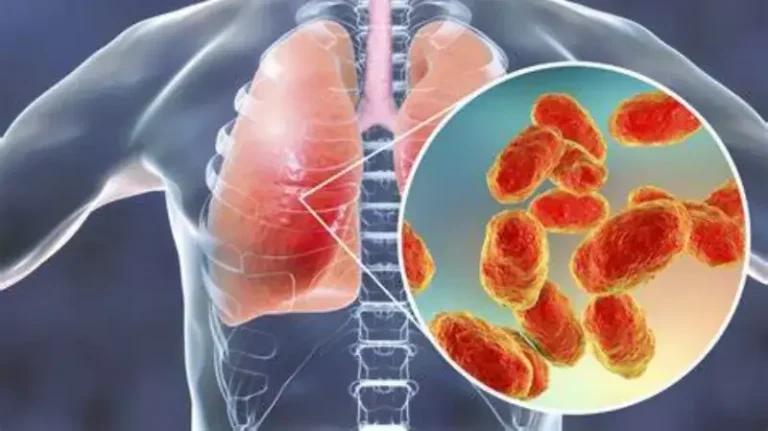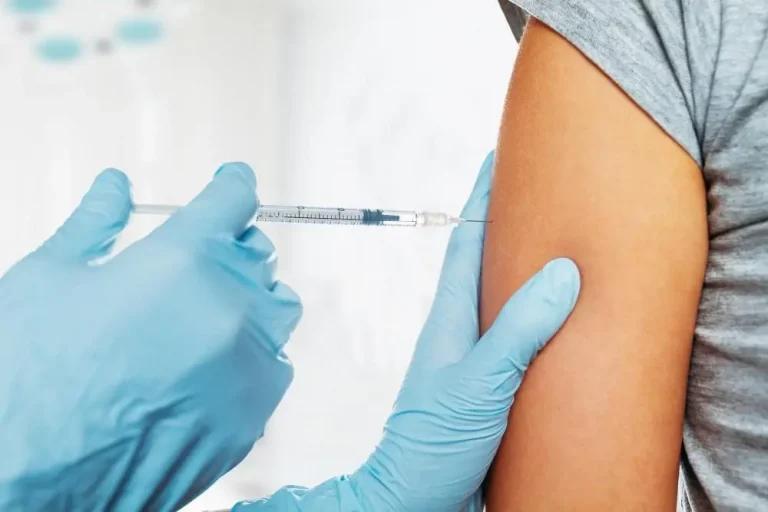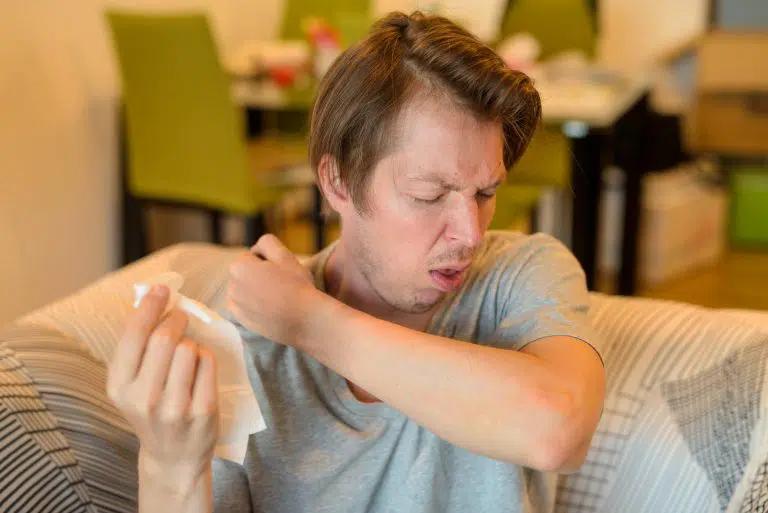Pneumonia is a lung infection that affects the tiny air sacs (alveoli) in your lungs. When you have pneumonia, these air sacs get inflamed and fill with fluid making it harder to breathe. Community-acquired pneumonia is the most common type of pneumonia. This term means it occurs outside of hospitals or other health care settings. Hospital-acquired pneumonia can be more serious and may be more resistant to antibiotics.
Lets take a look at some of the signs and symptoms that would alert you to having pneumonia.
📝 Common signs and symptoms of pneumonia
- Shortness of breath
- Difficulty breathing
- Chest pain when you breathe or cough
- Sneezing
- Cough with greenish, yellow phlegm
- Loss of appetite
- Tiredness
- Confusion, often in older people
- Joint or muscle pain
Symptoms may be different in babies, young children and older adults. Confusion is often seen in older adults and babies may make grunting noises when there is trouble breathing.
Pneumonia symptoms are often very similar to other chest and lung diseases, such as bronchitis, COPD (chronic obstructive pulmonary disease) or bronchitis. You are always recommended to see a healthcare provider to diagnose your symptoms accurately.
🦠 What are the causes of pneumonia?
There are four main causes of pneumonia:
- Bacterial infections
- Viral infections
- Fungal infections
- Aspiration
Bacterial infections
This is the most common cause. Bacterial pneumonia can occur in two ways; on its own or after you’ve had certain viral infections, such as a cold or the flu. The different types of bacteria that can cause pneumonia are;
- Streptococcus pneumoniae
- Legionella pneumophila
- Mycoplasma pneumoniae
- Chlamydia pneumoniae
- Haemophilus influenzae type b (Hib)
Viral infections
Viral pneumonia is often mild and you recover within a few weeks. In some circumstances it is serious and hospital treatment is needed. If you have viral pneumonia, you are at risk of also getting bacterial pneumonia. The different viruses that can cause pneumonia include:
- Respiratory syncytial virus (RSV)
- Some common cold and flu viruses
- SARS-CoV-2, the virus that causes coronavirus
Fungal infections
Fungal pneumonia is more common in people who have chronic health problems or weakened immune systems. These include:
- Pneumocystis pneumonia (PCP)
- Valley fever (Coccidioidomycosis)
- Histoplasmosis
- Cryptococcal pneumonia
Aspiration
Aspiration pneumonia. This can happen when you aspirate (accidentally breathe in) food or fluid into the lungs. If you are not able to cough out the food or fluid, it may cause an infection.
🧑 Who is at higher risk of pneumonia?
People with increased risk factors of developing pneumonia are:
- Babies and very young children
- Elderly people
- Smokers
- People with other health conditions, such heart disease, COPD (chronic obstructive pulmonary disease) and other lung diseases
- People with a weakened immune system such as HIV/AIDS or alcoholism, or have undergone an organ transplant
If you’re in one of these high risk groups you should take extra care to reduce your chances of catching pneumonia.
🩺 Diagnosis of pneumonia
A healthcare provider will normally carry out a physical exam, discuss symptoms, listen to your breathing with a stethoscope, measure blood pressure, pulse rate, temperature and the oxygen levels in your blood. Based on these findings your healthcare provider will decide whether you should go to the hospital or if you can be treated at home.
Other tests may be requested:
- Chest x-ray or CT scan
- Blood tests
- Sputum (spit) tests
- A urine sample for testing
🏥 Pneumonia treatment
Over-the-counter medications such as ibuprofen, rest and plenty of fluids can help manage the symptoms of pneumonia at home. Do not take cough medicines without first talking to your provider.
An infected person will be prescribed treatment depending on whether the cause is bacterial, viral or fungal. Treatment options include antibiotics, antivirals, or antifungals. Improvement in symptoms are normally seen within 2 to 4 weeks.
Some people at higher risk of becoming seriously ill may need to go to hospital for treatment. Hospital treatment may also involve being given IV fluids, oxygen therapy or fluid drainage to treat the infection (abscesses). A bronchoscopy to look inside your airways may be recommended if treatment is not working well.
Complications of pneumonia
Pneumonia can sometimes lead to complications. These include the following.
- A build-up of fluid around your lungs causing breathlessness
- Severe breathing difficulties can develop as a result of severe inflammation in your lungs and when using a breathing machine
- An abscess (collection of pus) in your lung might require treatment in hospital to drain it
- Septicaemia (blood poisoning) is an infection that can spread to other parts of your body and may be life threatening if not treated immediately
🔑 Prevention of pneumonia
The pneumococcal vaccine is the best form of prevention against Streptococcus pneumoniae, which is the most common cause of bacterial pneumonia.
The pneumonia vaccination is recommended for babies, older adults aged 65 plus and those with certain long-term medical conditions.
Other ways to prevent pneumonia
- Give up or do not start smoking
- Manage long term health conditions, such as diabetes, as pneumonia can quickly become life-threatening for people with underlying conditions
- Check you and other family members have had all vaccinations e.g. flu vaccine it can prevent pneumonia caused by the flu virus
Reduce the risk of passing the infection on by:
- Staying away from others while you are unwell
- Frequent handwashing
- Avoid hands touching your eyes, nose and mouth
- Avoid sharing food, drink and utensils
👣 Steps to help your body recover
There are some things you can do to help with recovery from pneumonia:
- Choose nutritious foods to help your body recover
- Drink plenty of fluids to help you stay hydrated
- Avoid alcohol and illegal drugs. They can weaken your immune system raising the risk of pneumonia complications
- Avoid second hand smoke. Smoke can worsen pneumonia symptoms
- Getting good quality sleep can help your body rest and improve the response of your immune system
- Increase physical activity gradually. It can help you regain your strength and improve your recovery. Speak to your provider about how much activity is right for you
- Sit upright to help you feel more comfortable and breathe more easily
📝 Conclusion
The signs and symptoms of pneumonia include a high fever, coughing up green/yellow phlegm, feeling exhausted and having trouble breathing. Bacteria, viruses, fungi, and breathing in foreign objects can cause pneumonia and the symptoms may differ depending on the cause. In children and elderly symptoms of pneumonia might include fast breathing, coughing, and having bluish skin or lips. Always seek advice from your healthcare provider for an accurate diagnosis.
Sources
- Pneumonia – NHS
- What is pneumonia? Causes, symptoms and risks – Asthma – Lung UK
- What Causes Pneumonia? – American Lung Association
Medical Disclaimer
NowPatient has taken all reasonable steps to ensure that all material is factually accurate, complete, and current. However, the knowledge and experience of a qualified healthcare professional should always be sought after instead of using the information on this page. Before taking any drug, you should always speak to your doctor or another qualified healthcare provider.
The information provided here about medications is subject to change and is not meant to include all uses, precautions, warnings, directions, drug interactions, allergic reactions, or negative effects. The absence of warnings or other information for a particular medication does not imply that the medication or medication combination is appropriate for all patients or for all possible purposes.









